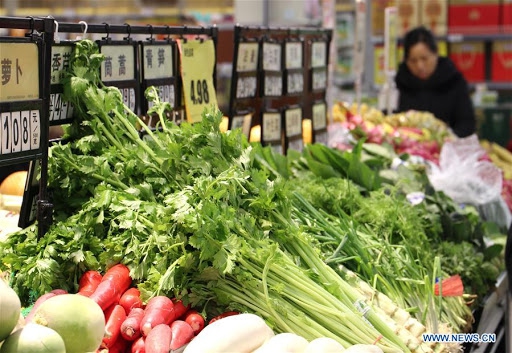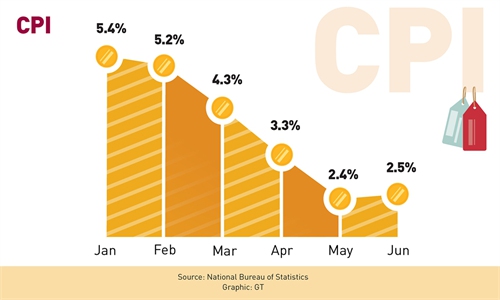
Photo: Xinhua
The nation's consumer price index (CPI), the main gauge of inflation, may have risen 2.7 or 2.8 percent in July, Chinese macroeconomists estimated, and the full-year figure could be around 3 percent, a reasonable level.
The National Bureau of Statistics (NBS) is scheduled to announce the figure on Monday.
Wu Chaoming, chief economist at Chasing Securities, said that China's CPI may have risen about 2.7 percent in July, as floods in certain areas of southern China hindered transportation and affected food supplies, which helped drive up food prices.
"Prices of food, including eggs and vegetables, edged up in consequence, and hot weather also inflated prices to a certain extent," he told the Global Times on Sunday.
According to the NBS, China's CPI rose 2.5 percent year-on-year in June.
However, experts have said that inflation would start to edge down in later months, as seasonal factors that drive up food prices gradually wane.
Wu said that as schools reopen and the government rolls out policies to stimulate consumption, pork demand and prices would continue to rise. However, as pork prices were rather high in the late months of 2019, the yearly growth of pork prices would decline in the final months of this year, which would in turn slow down overall CPI growth.
He predicted that China's CPI will grow about 2.4 percent and 1.1 percent in the third and fourth quarters. The full-year figure will be about 2.8 percent in 2020, a level that he said would be "acceptable."
Liu Xuezhi, a macroeconomics expert at the Bank of Communications, predicted that China's CPI is likely to rise about 3 percent in 2020.
"Prices in non-food sectors are relatively low, and as food prices correct with the waning of seasonal factors like hot weather, the CPI growth will also edge down," he told the Global Times.
China's CPI growth has continuously slowed since it hit an eight-year high of 5.4 percent in January, when China was hit by the coronavirus in an unexpected way.
Earlier, the Chinese government had set this year's CPI target at around 3.5 percent.
Liu also said that China's producer price index (PPI), which measures the cost of goods at the factory gate, would fall a bit more than 2 percent in July, rebounding from a 3-percent drop in June, as prices of industrial products gradually recover.
He also noted that China's PPI might turn positive in the fourth quarter.


